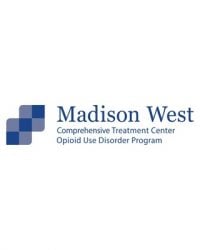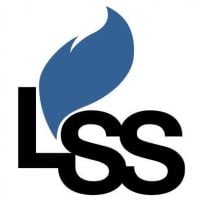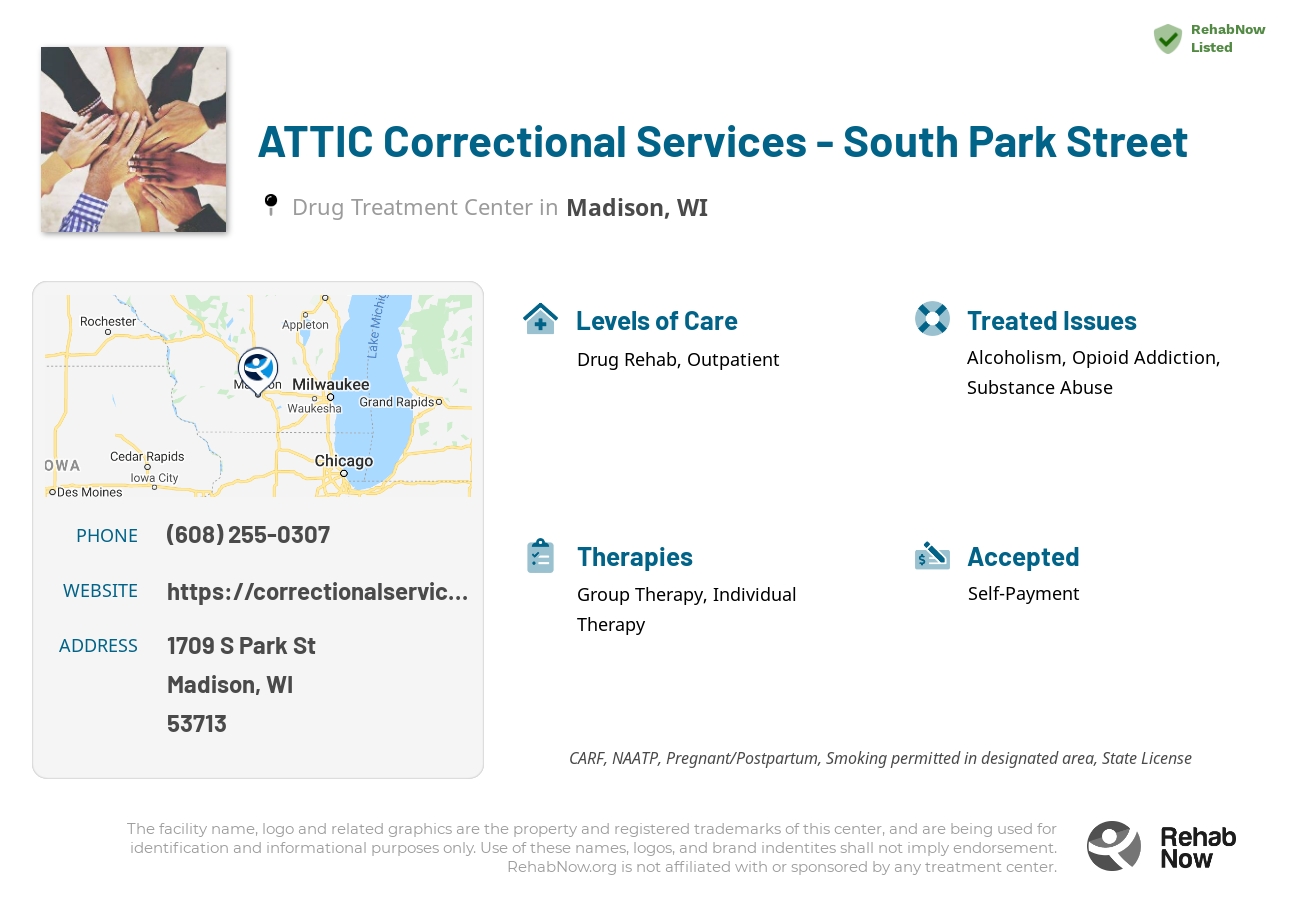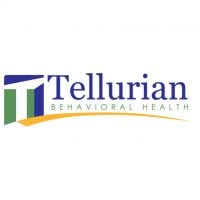
ATTIC Correctional Services - South Park Street
Drug Rehab Center in Madison, Wisconsin
- Substance Abuse
- Opioid Addiction
- Dual Diagnosis
- Drug Addiction
- Alcoholism
The ATTIC Correctional Services - South Park Street addiction treatment facility in Madison, Wisconsin offers comprehensive, multi-leveled addiction treatment services such as outpatient, aftercare support, residential care, drug rehab and counseling programs, as well as 12-step programs for individuals suffering from alcohol or opioid addiction, substance abuse, and dual diagnosis.
About This Wisconsin Facility
ATTIC Correctional Services - South Park Street is a substance abuse treatment center in Madison, Wisconsin focused on providing services to those suffering from addiction or dual diagnosis. This facility offers a wide range of services including Drug Rehab, Outpatient, Aftercare Support and Residential Levels of Care. ATTIC Correctional Services has been accredited by the Joint Commission on Accreditation of Healthcare Organizations (JCAHO) and is licensed by the State of Wisconsin as an addiction treatment center.
The facility offers an individualized and comprehensive approach to treatment, including assessment, diagnosis, and treatment planning. Their trained and experienced staff employ evidence-based practices to create individualized therapies that are tailored to the unique needs of each client. Treatment modalities include Cognitive Behavioral Therapy (CBT), Dialectical Behavioral Therapy (DBT), Psychodynamic Therapy, Supportive Counseling, and Motivational Interviewing, among others. In addition, they offer educational and relapse prevention groups, family counseling, and other support services.
Genders
Ages
Modality
Additional
Conditions and Issues Treated
Substance Abuse Treatment is important when getting sober, as it helps addicts learn the skills they need to live a clean life. There are many different kinds of recovery treatment, including medication-assisted therapy, behavioral therapeutic approaches and self-help groups, as well as counseling.
Opioid abuse has become a national epidemic in the last decade. The US has one of the world’s highest rates of opioid use and abuse, as well as opioid-related deaths. Opioids are classified as Schedule II-IV controlled substances in the US due to their high potential for abuse.
Oxycodone, hydrocodone, methadone, and fentanyl are the most common Opioids and are commonly prescribed to treat pain. Tolerance to opioids develops over time, making life difficult, if not impossible, without them. Opioid users often obtain the drugs illegally. They can be drug dealers, friends, or family members who do not have valid prescriptions.
The desire for a more intense high than prescription opioids can quickly lead to heroin use. Heroin users are more prone to illness and death due to the high risk of overdose.
Many opioid addicts who seek treatment believe that the only way to overcome their addiction is through medical detox and long-term drug addiction rehab. To help patients wean off their addiction and reduce the risk of overdose, medication-assisted therapy (MAT) involves prescribing a replacement opioid. Doctors use MAT in conjunction with other anti-craving medications to help patients maintain recovery. Due to the high risk of relapse, MAT is often combined with individual and group counseling and social support programs.
Levels of Care Offered at ATTIC Correctional Services - South Park Street
This center offers a variety of custom treatment tailored to individual recovery. Currently available are Aftercare Support, Drug Rehab, Outpatient, Residential, with additional therapies available as listed below.
An outpatient treatment program is set up to help with alcohol or drug addiction or a co-occurring disorder. The patient must attend the facility for their therapy and other programs but can return home each night.
The frequency of mandatory attendance decreases after much of ATTIC Correctional Services - South Park Street‘s program is complete.
Outpatient treatment is a recovery approach that allows recovering addicts to live at home while getting rehab for addiction
An outpatient can include day treatments which include attending group sessions one hour per week. A person living in an outpatient environment may be allowed the opportunity to work full time if they choose to and continue studies without interruption from drugs/alcohol.
Outpatient treatment is an option for people who want to maintain their careers and families. Outpatients live at home but attend treatment such as individual counseling, group counseling, or twelve-step meetings during the day.
Residential treatment programs are those that offer housing and meals in addition to substance abuse treatment. Rehab facilities that offer residential treatment allow patients to focus solely on recovery, in an environment totally separate from their lives. Some rehab centers specialize in short-term residential treatment (a few days to a week or two), while others solely provide treatment on a long-term basis (several weeks to months). Some offer both, and tailor treatment to the patient’s individual requirements.
Aftercare support is vital to the success of someone in drug or alcohol treatment. It involves assisting with entering a sober living home, getting career counseling or educational assistance and even getting the individual lined up with programs like AA and NA. This support helps recovering addicts readjust to normal day-to-day activities and maintain sobriety.
When a person is in drug or alcohol treatment, they have to increase their focus on themselves. They need to learn how to recognize the triggers that cause them to relapse and learn the habits that would benefit them if they were to be sober. This is all part of the growth in recovery, and aftercare is essential to that process.
Therapies & Programs
At ATTIC Correctional Services - South Park Street , to learn from past mistakes and improve one’s situation, the recovering person meets individually with a therapist. The counselor or therapist will address addiction causes, triggers, mental issues, dual diagnosis, and aftercare plans during this time. This is a very intense and challenging process. Some clients find it easier to open up to someone other than family or friends who understand their struggles with addiction.
In group therapy, recovering addicts meet with a therapist and other people in recovery. Some groups are closed, meaning only people who share the same addiction or problem can attend. Others are open to anyone who wants to stop using drugs or drinking alcohol. Group therapy sessions typically focus on one topic each week or month so that recovering addicts can discuss issues they face daily.
Cognitive Behavioral Therapy (CBT) is based on the idea that how we feel, think and act all interact together. It helps people explore their thoughts for problems (or false beliefs) that influence their mood and actions. CBT is very goal-oriented, which means that the therapist and patient work together on a specific problem. In addition to helping a client focus on thoughts that can be changed, CBT also allows them to take an active role in their treatment. Our thoughts determine our feelings and behaviors; our feelings affect our thoughts, and our behaviors change our thoughts and feelings.
Drug and alcohol addiction can lead to a breakdown in life skills. Learning certain life skills can help those who are struggling with addiction. Life skills training at ATTIC Correctional Services - South Park Street in Madison, WI teaches patients skills such as time management, budgeting, and social abilities to improve their quality of life and prevent relapse.
An addict’s life skills are maladaptive, meaning they are counterproductive. An addict may have learned poor time management skills growing up, have a hard time budgeting money, or be socially awkward. An addict’s poor life skills can lead to relapse and the inability to achieve long-term sobriety. Life skills training teaches patients effective coping mechanisms, which can help them live a clean and sober life.
Payment Options Accepted
For specific insurance or payment methods please contact us.
ATTIC Correctional Services Associated Centers
Discover treatment facilities under the same provider.
- ATTIC Correctional Services - University Avenue in Green Bay, WI
- ATTIC Correctional Services - Kipling Drive in Madison, WI
- ATTIC Correctional Services - West Washington street in Appleton, WI
Learn More About ATTIC Correctional Services Centers
Additional Details
Specifics, location, and helpful extra information.
Madison, Wisconsin 53713 Phone Number(608) 255-0307 Meta DetailsUpdated November 25, 2023
Staff Verified
Patient Reviews
There are no reviews yet. Be the first one to write one.
Madison, Wisconsin Addiction Information
Wisconsin has some of the highest rates in the United States for both adolescent and adult substance abuse. Since 2009, the state has been experiencing the same escalating rates of drug abuse and addiction as the rest of the country. The major concerns are the misuse of prescription painkillers and the escalating number of deaths due to alcohol-related liver disease.
Madison, Wisconsin is struggling with an opioid crisis. In 2017, there were 234 drug overdoses in Madison. 1 in 5 residents knows someone who has died from a drug overdose. 8.3% of Madison residents report heavy drinking. This area ranks 4th among Wisconsin cities for drug use disorders. The centers in Madison offer a variety of services, including individual and group counseling, medication-assisted treatment, and detoxification.
Treatment in Nearby Cities
- Viroqua, WI (83.1 mi.)
- Middleton, WI (6.5 mi.)
- Port Washington, WI (80.0 mi.)
- Fitchburg, WI (3.5 mi.)
- Kenosha, WI (86.0 mi.)
Centers near ATTIC Correctional Services - South Park Street



The facility name, logo and brand are the property and registered trademarks of ATTIC Correctional Services - South Park Street, and are being used for identification and informational purposes only. Use of these names, logos and brands shall not imply endorsement. RehabNow.org is not affiliated with or sponsored by ATTIC Correctional Services - South Park Street.



